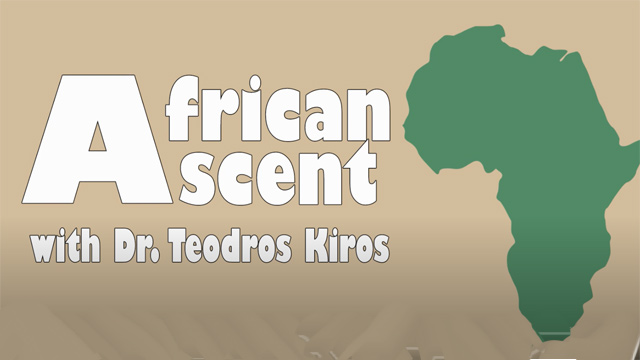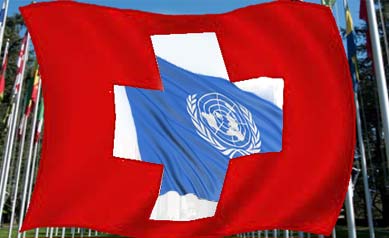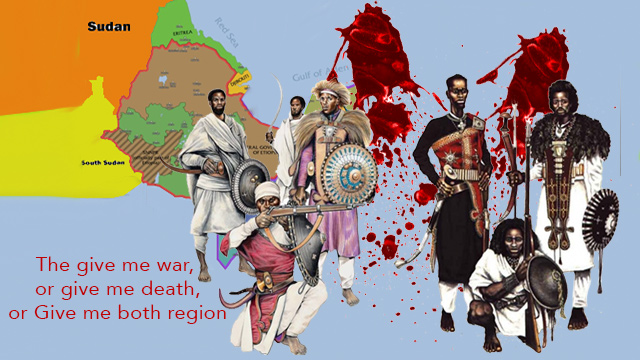A Conversation between Two Professors: A Tigrayan and An Eritrean

At the outset, Prof. Tedros Kiros declares that, in its fifteen years of existence, African Ascent Television Program never had an interview conducted in Tigrinya language, the mother tongue of the host. As such, the viewer can see the elation visibly in his demeanor. What made it unique, the guest, Prof. Tekle Woldemikael, is the host’s childhood friend. Consequently, the conversation between the two scholars turned out to be riveting. Candid. Straight from the mind and heart. The flooding of the memory came to the fore slowly, in fits and starts. One hour later, however, it left, at least, this viewer glued to the chair for a long time as it elicited memories of childhood. The places and spaces the memories of the two childhood friends were cemented in the same places and spaces in which subsequent generations’ memories were imprinted upon; granted, they would be a generation or two at a remove but the same landscape shaped the identity that made them all who they are today.
Now, at the cusp of retirement, the two professors decided to speak-up with open hearts. Both grew up in Asmara. One now identifies himself as a Tigrayan the other as an Eritrean but the respect towards each other runs deep. This is the background from which the story moves forward to social and political discussions from their privileged and accomplished spaces they occupy in the U.S.
What the immigrant story tells about the people of the Horn is that they have that drive to succeed, many of whom do succeed as they make impressive strides in every field of endeavors that they pursue. More impressive is the number of advanced degree holders. At long last, two educators, one Eritrean and one Tigrayan come to the fore to speak truth to ignorance, emit a much-needed light to the doom and gloom scenario the Horn of Africa appears to suffer from. At minimum, what a viewer will notice in the conversation is that these two professors show the creative side of an immigrant experience in the United States where they were able to shine for forty years in the coveted institutions of higher education.
In an interview, Ocean Vuong describes a remarkable book he read in the following way:
“…one of the most powerful testaments of rewriting or repositioning what immigration is on a global scale. And it positions the immigrant in the trajectory of the artist because I think immigration demands a great amount of innovation and creativity. Nobody really survives the process of immigrating to a new country — to America, no less, which is so rich and complex — without being creative. So, I love this book because it kind of pushes creativity and innovation at the center, that immigrants are not just victims who are trying to get by, they are active agents in their own life.”
The two professors have done exactly that in that ever-evolving narrative of an immigrant who arrives to the West to reconstruct life anew in place of the lasndscape he/she left behind as the blank canvas is ready for anyone who wishes to paint it, write, and live in it. For such a narrative to have a lasting impact, however, will require tenacity, consistency, and determination until it gains viewers and listeners if the educated lots’ thoughtful ideas are going to have any meaningful resonance. The change of narrative will require concerted efforts across the board in the written form and in the spoken form to purify the poisoned sociopolitical well in our region. To be sure, the two professors are cognizant of such a fact, which is why they decided to speak up and speak out, one can make a safe presumption.
Meanwhile, sieving through the plethora of social media will show discourse malnourishment; it is rather difficult to fathom how anyone can take the self-appointed analyst seriously when the show starts with eskista – dancing to Tigrinya tune as an interlude. The incongruence between the message being conveyed to the mood the dance imbues leaves viewers in a disequilibrium making the message not worth pursuing. In addition, no ambivalence in the thinking process, no nuanced thought processes whatsoever. The world they inhabit is black and white. No grey area.
The ambivalence and/or the wholesale dismissal of the educated lot amongst us has its own history where Eritreans who showed some disposition to intelligence are summarily accused of being Menk’aE on the one end and Falul on the other. The former is discussed between the two professors in the clip. To this day, in the Awate forum, one sees such blatant dismissal of educated lot in their respective professions. Not only that but the PhDs are also trashed and thrashed by those who cannot even put their real names behind their words when making such assertions as these two professors in question readily do. The hope, of course, is that this time, maybe this time, comments focus on what the two PhD holders who have had forty years of experience in their fields receive some modicum of respect. Disagreeing with the ideas they are espousing is one thing but to focus on their person as a subject of argument is nothing more than ad hominem attack, a mark of incapacity to synthesis, to argue logically, and analytically which requires a possession of certain skills in the art of dialogue.
At long last, educated Eritreans are speaking up and speaking out. “The age of innocence, the age of youth, the age of hope, the age of radiance like roses…” is what it sounds like when the two professors, whose friendship spans to their childhood, reminisce about their upbringing in Asmara, Eritrea.
As memory begets memory not only between the two who are conversing CLICK HERE but also the reader is compelled to travel with them. My own memories were triggered from far and near. One poem that’s cited under the reference was obtained from Negarit 105. The speaker in the poem dwells on notions of why Eritrea lacks PhD holders in the graduation ceremony. This brings the speaker back to the reality of life in the diaspora where more and more Eritreans increasingly possess PhDs. In a culture that promotes armed heroism and mercilessness as an ultimate sign of leadership and manhood, where womanhood’s purpose is to pump testosterone to manhood, all other pillars of society are considered secondary, including education. The educated become the punching bag that can be denigrated, excluded, or are saved for belittlement when political situations demand victims in its midst. Interestingly, a story is related by Prof Kiros in how he went to open a school in Tigray and was rebuffed by one of the prominent leaders of TPLF, which confirms the apprehension of revolutionary generation leaders from educated citizens with PhDs. The kind of stonewalling people faced in Eritrea appears to be no different in Tigray when educated Tigrayans armed with knowledge and wherewithal try to contribute, the scorning by those in power is painful to hear.
Marcel Proust’s (1871 -1922) early childhood as chronicled in Remembrances of things past, admits his recollection of his childhood bordering on an infelicitous, an unhappy experience. Professor Woldemikael and Professor Kiros, however, remember their childhood as being full of hope, full of happiness. Whereas Proust’s was singularly about his individual childhood experience, the two professors speak individually as well as collectively. The collective remembrances gravitate towards other childhood friends. Ato Kassahun Checole, Ato Mateos, Wedi Balilla, Eyob Bisirat, (he was martyred one of them points out to the other), and his brother Solomon is mentioned.
The name Enda Mariam (Prominent Tewahdo Church in Asmara) triggers memories of childhood in Prof Tedros whereupon he recollects of his mother taking him to the church every Sunday to pray when he felt lonely. The conversation, naturally, gravitates to recalling names from their common experience. Thus, Prof. Kiros remembers. Prof. Woldemikael assists in the remembrance process with the name of their Geez teacher. And both professors’ faces beam with warm memories from their formative years. The Geez they learned as children, at least one of them is teaching his own child Geez along the way he is relearning it himself, every Saturday, he warmly acknowledges. The memory of the past is reinforced as the father imprints a memory on his own child through the lived experience.
The memory bank circles back to Enda Mariam of its centeredness not only in their life but geographically speaking as the umbilical cord of the city itself. Prof. Woldemikael brings out the Grand Mosque that’s within a few blocks from the Church, where the bells of the Church and the calls to prayers were the mainstay of their surroundings. The implication being the spiritual spaces and the spiritual sounds that radiated had their own influence in how it shaped their respective identity as the city dwellers. The two are reflecting at a critical moment when Eritrea and Tigray are at the cusp of exterminating one another. The center of the past appeared to have held them concretely. Unlike in “the second coming,” in the aftermath of WWWI, the center didn’t seem to hold, says the poet. Here, the center was the elixir that glued their ethical values, their morals, their being an upstanding citizen of their time.
Such fond remembrances of the past are now juxtaposed to today’s Eritrean children, to the upbringing where they are drafted to indefinite military service, ostensibly, young Eritreans fought two wars in the last twenty years. Today’s childhood appears to have very little meaning, they contend in agreement. When the professors were growing up, they crawled, they walked, they ran around the neighborhoods as part and parcel of their childhood experiences. Today, however, even if they want to grow, the circumstance is such that Eritrean children have been unable to grow the way a child ought to grow under his/her parents’ guidance. How do we unshackle ourselves as a society from this kind of a hopeless upbringing so our children can experience that normal formative childhood the way the two professors had it growing up? The question is posed to Prof Woldemikael, if he could expound upon this as a professor of sociology? This is purposely left for the reader to find out when watching the conversation between the two professors.
References:
Kiros, T. (2021). African Ascent: Tekle M. Woldemikael
Proust, M. (1871-1922). Remembrance of things past
Negarit 105 : ብምልቃም ቡን ተመሪቁ – Trained in Coffee Bean picking – وتخرج في قطف حبوب البن.
See the Tigrinya poem in question beneath the last reference question beneath the last reference.
Yeats, W.B. (1919). the-second-coming
ሰላም ሰብ ዓወተ፡
ምረቓ ተመሃሮ ኮለጃት ኤርትራ
ክትግበር ርኤኹ ሎምቅነ በብተራ
ዘሕጉስ እዩ ክትርኢ ክትቅበል ተመሃሪት ፍረ-ጻዕራ
ውሑዳት መሰታይ ዝኾኑ መማህራን ርእየ ደስ ኢሉኒ
ኣብ ቀረባ ዝፈልጦ ግና ሓደ ጥራይ ምዃኑ ኣተሓሳሲቡኒ
ብዓል’ነ መዓሾ መሃንዘል ኣብዚ ከምዘለና ዘንጊዔዮ’ሲ ኣስሒቑኒ
ዓቕሊ ገይረ ትዊታት የማነ-ገ እንተ’ንበብኩ
ኣብ ዩ-ትዩብ’ውን ዝተወረ ጽን ኢለ ‘ተድመጽኩ
ፕሮፈሶር እትብል ማዓርግ ተሪፈ እንኮ ጊዜ ካይሰማዕኩ
ናብ ጎረቤትና ስግር እንተበልካ
ኩሉ ዶክቲሩ ይውረ ይገርመካ
ፕሮፈሶር በሽበሽ ፈቐድኡ ኢሎሞ ዝጸንሓካ
ኣብ ዓዋተ ካይተረፈ ፕሮፈሶር መሊኡና
ሳላ Hope/Sultan/Paul, እንታይ ስኢንና
ስፍስፍ ኣቢሎም ማዓርግ የቐምጡ ኣብ ርእስና
እሞ ኣብ ዓድና ድኣ ንምንታይ እዚ መዓርግ ውሒዱ
መሲልዎም ኣሕሉቕና ዝተዋህበ ንጸዓዱ?
ወይስ ጠፊእዎም ምሁራትና ሕድሕድ ምንኣኣዱ
እታ ሓቂ ግና ሓለቓ ሃገር ብዓብኦም እዮም ስለ ዘይፈቐዱ
እንትርፊ ጸርፊን ሽዳን ምንኣድ ምምዕራግ ስለ ዘይለመዱ
ይውረ ብብጾቶም ምሁር ዝብሃል ካብ ቀደሞም ምስጸመዱ
ዝኾነ ኮይኑ
ነዞም ክንሰምዖም ዘይዛረቡ ካይሓሰቡ ካየስተማቐሩ
ኣብ ውሽጢ ሃገር ኮይኖም ብጽፍሮም ዝመራመሩ
ምስጋና ይብጽሓዮም ነዞም ዘሰልጥኑ ዘስተምህሩ::




Awate Forum